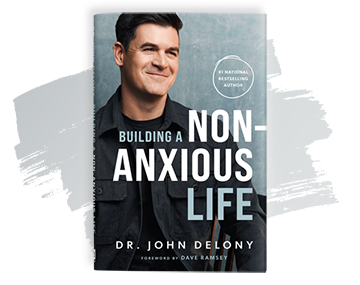Anxiety in Teens: 8 Ways You Can Help Your Child
11 Min Read | Apr 25, 2024

The awkward transition from childhood to adulthood known as adolescence is wonderful and mind-boggling and terrifying . . . for both kids and parents. It’s full of endless changes, ridiculous pressures to perform and raging hormones. No wonder the National Institute of Mental Health states that nearly one in three teenagers will experience an anxiety disorder.1
Before we go any further, I want to be clear: An anxious teen is not a broken one. At its core, anxiety in a teenager is a signal. It’s an alarm telling them they’re unsafe, out of control or lonely.
So, here’s the deal: To begin healing from anxiety, your child needs secure and loving relationships. They need and want you. Your child isn’t a problem to be fixed. They’re a precious person you’ve been entrusted to love. They often don’t need your advice as much as they need your presence.
With that in mind, let’s talk about ways you can help your teen through their anxiety.
1. Check yourself.
First, I need to share some tough love: If you’re not okay, your kid probably won’t be okay. When you’re worried about your kid, look in the mirror first. It’s very hard for a child to not be anxious in a chaotic home. If you (or your partner) are facing mental health challenges, unemployment, divorce, addiction or loneliness, then your child will be directly impacted by the stress.
Get expert money advice to reach your money goals faster!
As the parent, think of yourself as the thermostat that sets the “emotional temperature” of your home. Whether you realize it or not, your child is watching and absorbing your mood, attitude and emotional energy. When you walk into the room full of anger and anxiety, your child will absorb those feelings, internalize them, and assume it’s their fault. But this works the other way too! If you’re mentally, emotionally and spiritually healthy, you can be a source of peace and calm and connection.
Hear me say this: You are worth being well. Do what it takes to deal with your own anxiety, including seeing a therapist, if that would be helpful.
2. Check your marriage (or your romantic relationship).
After taking care of yourself, the next step is to take a hard look at your marriage (or your romantic relationship). A kid’s relationship to their parents is their anchor and model for how to connect with other people. When they feel tethered and safe at home, they can face the challenges and chaos that life will surely throw at them. But if you and your spouse aren’t connected to each other, your child won’t feel secure either. If you and your spouse relate to each other in anger and disrespect, your child will absorb and imitate those behaviors.
I want to pause and acknowledge those who are in a complex situation. Maybe you’re a single mom working three jobs just to keep the lights on. Maybe you’re on your second or third marriage. If you’re in a relationship, do everything you can to model a loving, supportive relationship for your child. If you’re not with anyone right now, then talk about your child’s other parent with dignity and respect—even when it’s hard.
Remember: Teens are watching and absorbing everything.
3. Encourage your child to sleep, eat, and be active.
Our mental and physical health are intertwined, making it impossible to calm the mind when the body is not well. One of the best ways to help someone with anxiety is to encourage them to take ownership of their body. And as a parent, you don’t only encourage your child—it is your job to make sure they’re getting what they need.
Let me say it again: It is your job to make sure your child’s body is taken care of. Here are the three basic ways to do so:
- Eat: Our food has a direct impact on our mood. Take a stand and refuse to feed your child garbage. Make sure your teen is eating nutritious, whole foods and cutting out as much sugar and caffeine as possible (which can mimic or trigger the physical symptoms of anxiety). If money is a concern, you can learn how to eat healthy on a budget.
- Sleep: In his book Why We Sleep, researcher and neurologist Dr. Matthew Walker notes that sleep deprivation causes increased aggression, bullying, and suicidal thoughts and behaviors in adolescents. Teenagers need between eight to 10 hours of sleep every single night. Put guardrails around technology use at night so your teen can wind down properly before bed. Also, teens’ circadian rhythms are naturally set a little later in the evening to later in the morning—so don’t freak out when they’re in a night owl phase and let them sleep in whenever possible. They aren’t always being lazy—they’re often getting much needed restorative, regenerative sleep.
- Be active: Whenever possible, encourage your teen to move, run, lift, walk, play or hike, and do those things with them. Take a family walk after dinner. Throw foam balls at each other until you’re both out of breath from running and laughing. Many studies have shown that exercise improves mental health, including anxiety.2
4. Help your teen evaluate and locate the source of their anxiety.
Remember, at its core, anxiety is a result of feeling unsafe, out of control, and disconnected from meaningful relationships. You can help your teen examine their ecosystem—the sum total of the world around them—to see what’s contributing to their anxiety.
Ask your child these three questions:
- Where do they feel unsafe? Are they being bullied? Do they feel attacked online? Are they being physically abused?
- Where do they feel out of control? Is there something coming up that they’re worried about? Are they failing a class at school? Are they exhausted from an insane schedule?
- Where do they feel disconnected? Is it with you (as the parent), a specific friendship, teacher, teammate or group? Do they feel lonely at school or church? Do they have a safe group of friends they regularly hang out with?
Here's A Tip
Help your teen get clarity around the situations and circumstances that might be causing feelings of stress and anxiety with my free Anxiety Test.
5. Teach your child how to examine their feelings.
After you’ve identified the sources of anxiety, teach your child a healthy way to respond to their feelings. By the way, this is a skill that many adults don’t have. If you’re not comfortable with your own feelings, focus on getting well first (see #1) so you can lead by example.
You can help your child navigate their anxiety by inviting them to:
- Acknowledge and call out their feelings
- Demand evidence from them
- Recognize what they can and can’t control
Let me illustrate this with an example. One Saturday afternoon when my son Hank was six years old, he was feeling super down. My wife went out to work in the garden with him and see if he would tell her what was going on. Turns out he was trying to figure out who he would choose to live with when my wife and I got divorced . . .
And we weren’t anywhere close to getting divorced! He’d heard about the havoc of divorce from an audiobook, and in his little 6-year-old mind, he assumed divorce was just a part of life. Heartbreaking, huh?
At this point, it didn’t matter that his mom and I weren’t anywhere near divorce. The important thing was that his feelings were real. Instead of correcting him, my wife responded with, “You sound scared, and that’s a real feeling. Tell me where in your body you feel scared. Your heart’s beating faster, and your tummy’s feeling heavy? That’s what happens when I get scared too! Thanks for sharing that with me.” She was simply acknowledging the feelings and giving them space to breathe.
The second part of this conversation is to demand evidence for those feelings. I asked Hank, “Do you think mommy and I are going to get divorced?” And he timidly answered, “No.” My wife and I then talked about our commitment to one another and how we would not be getting divorced. Ever.
In this case, Hank had no evidence to support his fear. This happens all the time with anxiety. But on occasion, we do have good evidence for our fears. Your child might be anxious about failing a test . . . and they very well might. Your child might be terrified about a divorce . . . and you just got the papers in the mail. Let the evidence speak for itself. Covering up realities we don’t want to face only leads to more anxiety.
The last step is to help your child focus on what they can control. Can my son control his parents’ relationship? Unfortunately for him, no. In fact, kids control very little. But he can control whether or not he talks about how he’s feeling. He can practice being honest and trust that I’ll be there for him as long as possible. He can learn to write down what he’s feeling.
Want to Build a Non-Anxious Life?
For guidance on making the daily choices that will help you be well, check out Dr. John Delony’s new book.
6. Make relationships a top priority.
It is so, so important for your teen to have face-to-face interactions with you and other people who love them. I know, I know, you might think they’d prefer to stare at a screen every single second of the day, but what kids crave (and need) more than anything is your attention—physical proof that they matter to you.
Be intentional about doing things with your child, whether it’s a regular pizza and board game night, having their basketball team over to grill out, or taking your family on hikes. Go fishing. Have a water balloon fight.
Also, recognize that they will naturally transition from wanting to hang out with you to wanting to hang out with their friends, coaches, mentors or other folks. Let them foster new relationships. (If your kids’ friends are a bunch of idiots, and your kid is seeking approval from people who don’t have their best interests in mind, then you might need to step in and cut off those friendships.) The best-case scenario is that you create a home environment that is welcoming for your teen and their friends.
7. Reduce or eliminate screen time whenever possible.
The evidence is overwhelming: Screen time is devastating for mental health—especially in children and teens. Over the past decade, the number of children admitted to hospitals for suicidal thoughts and actions has doubled.3 And studies repeatedly link increased social media use to higher rates of depression and anxiety.4
I know it’s hard. I’m living this unfolding nightmare with you. As a dad trying to do his best and a mental health professional, I don’t allow either of my children access to personal devices. I encourage you to do the same, and to limit other forms of media—like shows and movies and video games. If you do allow them to have screens, put guardrails in place to limit their use to specific times of day for specific purposes. (I unpack some practical ways to handle social media in this episode of my show.)
8. If necessary, get your child professional help.
If anxiety is impairing your child’s ability to complete daily tasks or interact with people, if it suddenly becomes debilitating and overwhelming, or if it lasts for several months, please seek professional help. A great place to start is with their school counselor, but you can always do research to find a therapist outside of school.
In almost every situation, when you take your child to counseling, you as the parent are the client. Any halfway decent counselor will get to know you and the dynamics of your house before they start working with your child. They should also establish some ground rules about patient confidentiality—making it clear what they will and won’t share with you from sessions with your child. Don’t be caught off guard if the counselor or psychologist asks you to make changes to the way you think and act as part of your child’s treatment plan.
Remember: Your child is not a problem to fix—they’re a human being to love. Keep that attitude front and center as you work with a counselor.
Anxiety Doesn’t Have to Be Forever
For many kids, anxiety will come and go. As you work to parent your child when they’re anxious, be kind to yourself. Keep communication open. Create space for your teen to speak honestly. And when you screw up (and you will), be honest and vulnerable. Be confident in the boring, repetitive, frustrating days. And just keep showing up!
I have one last suggestion for you: As you work to keep communication open with your teens on the good and the hard days, check out my conversation starters, Questions for Humans: Parents and Teens. These thought-provoking cards will help you put down your phones and actually connect. And I guarantee that some of these cards are just ridiculous enough to make it fun for your teen.




